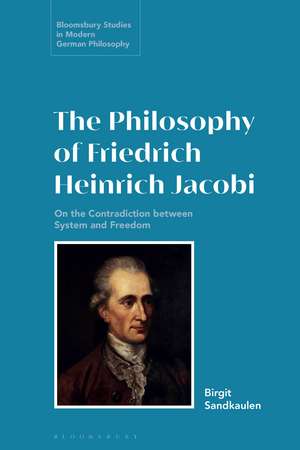The Philosophy of Friedrich Heinrich Jacobi: On the Contradiction between System and Freedom: Bloomsbury Studies in Modern German Philosophy
Autor Birgit Sandkaulen Traducere de Matt Erlinen Limba Engleză Hardback – 19 apr 2023
Preț: 538.77 lei
Preț vechi: 773.07 lei
-30% Nou
Puncte Express: 808
Preț estimativ în valută:
103.14€ • 106.07$ • 85.57£
103.14€ • 106.07$ • 85.57£
Carte disponibilă
Livrare economică 29 ianuarie-12 februarie
Preluare comenzi: 021 569.72.76
Specificații
ISBN-13: 9781350235717
ISBN-10: 1350235717
Pagini: 280
Dimensiuni: 156 x 234 mm
Greutate: 0.45 kg
Editura: Bloomsbury Publishing
Colecția Bloomsbury Academic
Seria Bloomsbury Studies in Modern German Philosophy
Locul publicării:London, United Kingdom
ISBN-10: 1350235717
Pagini: 280
Dimensiuni: 156 x 234 mm
Greutate: 0.45 kg
Editura: Bloomsbury Publishing
Colecția Bloomsbury Academic
Seria Bloomsbury Studies in Modern German Philosophy
Locul publicării:London, United Kingdom
Caracteristici
Offers insights into one of the most influential, most understudied, and currently most interesting figures of classical German philosophy
Notă biografică
Birgit Sandkaulen is Professor of Philosophy and Director of the Research Center for Classical German Philosophy / Hegel-Archive at Ruhr-University Bochum, Germany. Her research focuses especially on Hegel and Jacobi. She is the editor of Jacobi's Correspondence and co-editor of a new "Digital Jacobi Lexicon" at the Saxon Academy of Sciences and Humanities in Leipzig. She has published several books on Jacobi, including Grund und Ursache. Die Vernunftkritik Jacobis (2000).
Cuprins
PrefaceNote on TranslationList of Abbreviations Part I. Leitmotifs1. Life and Work2. Jacobi's "Spinoza and Antispinoza"3. Groundless Belief: A Philosophical Provocation4. Does Spirit have Ésprit? On the Figures of Soul, Spirit, and Reason in Jacobi's Philosophy5. Between Spinoza and Kant: Jacobi on Freedom and Persons 6. That, What, or Who? Jacobi and the Discourse on Persons 7. Brother Henriette? Deconstructions of Friendship in Derrida and Jacobi 8. "I am and there are things outside me". Overcoming the "Consciousness-Paradigm" with Jacobi's Realism9. The "Tiresome Thing in Itself." Kant - Jacobi - Fichte Part II. Critical Relations10. I-hood and Person: The Fichtean Aporia and the Debate with Jacobi11. Fichte's Vocation of Man - A Convincing Response to Jacobi? 12. This Individual and No Other? On the Individuality of the Person in Schelling's Freedom Essay 13. System and Temporality. Jacobi Contra Hegel and Schelling 14. Third Position of Thought Towards Objectivity: Immediate Knowing 15. Metaphysics or Logic? The Importance of Spinoza in Hegel's Science of Logic Bibliography Proof of first publication Index
Recenzii
Written in a lively and elegant style, this is the best book on Jacobi I know of. It will quickly become the standard place for English speakers to begin exploring Jacobi's thought; its treatment of his relation to Kant, Fichte, Hegel, and Schelling will transform the Anglo-American reception of classical German philosophy.
Jacobi's importance for modern German philosophy has long been downplayed in the Anglo-American tradition, and no one is more qualified than Birgit Sandkaulen to remedy this situation. Sandkaulen gives us an insightful, sympathetic discussion of Jacobi's "practical realism", thereby establishing not just his influence on figures such as Fichte and Hegel, but his impact on existentialism and post-modernism as well.
Sandkaulen's unapologetic advocacy of Jacobi's philosophy sets her book apart from previous monographs on the subject. Readers would be hard-pressed to find a study of Jacobi's thought that is similarly authoritative, original, and substantively illuminating. Those seeking clarity regarding his central ideas and their significance in the context of classical German philosophy will find it in this book.
This is both a first-rate work in the history of philosophy, and the needed remedy for insufficient recognition of Jacobi and his influence on German Idealism. Sandkaulen argues powerfully for the importance of Jacobi's complex double philosophy, and his grounding of philosophy in the experience of human action.
Birgit Sandkaulen's collection of essays presents a masterful, engaging, and most welcome introduction to the thought of Friedrich Heinrich Jacobi, the éminence grise of the age of German Idealism, who, today too often neglected, initiated and shaped many of its key philosophical debates.
Jacobi's importance for modern German philosophy has long been downplayed in the Anglo-American tradition, and no one is more qualified than Birgit Sandkaulen to remedy this situation. Sandkaulen gives us an insightful, sympathetic discussion of Jacobi's "practical realism", thereby establishing not just his influence on figures such as Fichte and Hegel, but his impact on existentialism and post-modernism as well.
Sandkaulen's unapologetic advocacy of Jacobi's philosophy sets her book apart from previous monographs on the subject. Readers would be hard-pressed to find a study of Jacobi's thought that is similarly authoritative, original, and substantively illuminating. Those seeking clarity regarding his central ideas and their significance in the context of classical German philosophy will find it in this book.
This is both a first-rate work in the history of philosophy, and the needed remedy for insufficient recognition of Jacobi and his influence on German Idealism. Sandkaulen argues powerfully for the importance of Jacobi's complex double philosophy, and his grounding of philosophy in the experience of human action.
Birgit Sandkaulen's collection of essays presents a masterful, engaging, and most welcome introduction to the thought of Friedrich Heinrich Jacobi, the éminence grise of the age of German Idealism, who, today too often neglected, initiated and shaped many of its key philosophical debates.







